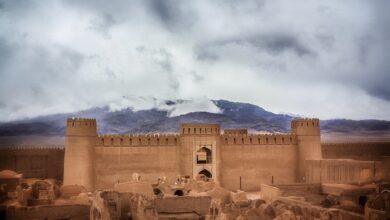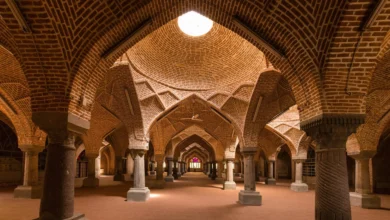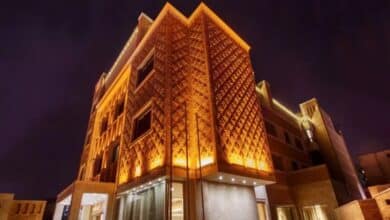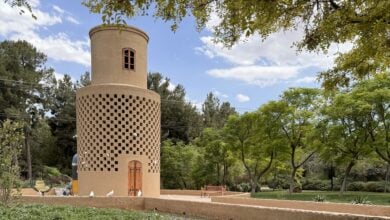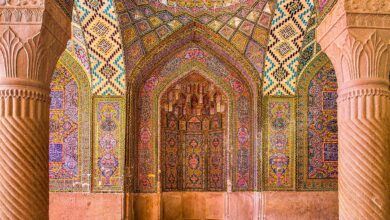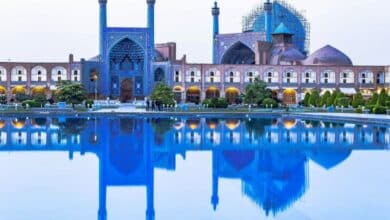Narenjestan-e Ghavam: Shiraz’s Historical Garden and Mansion
Marvel at the Exquisite Craftsmanship and Lush Greenery
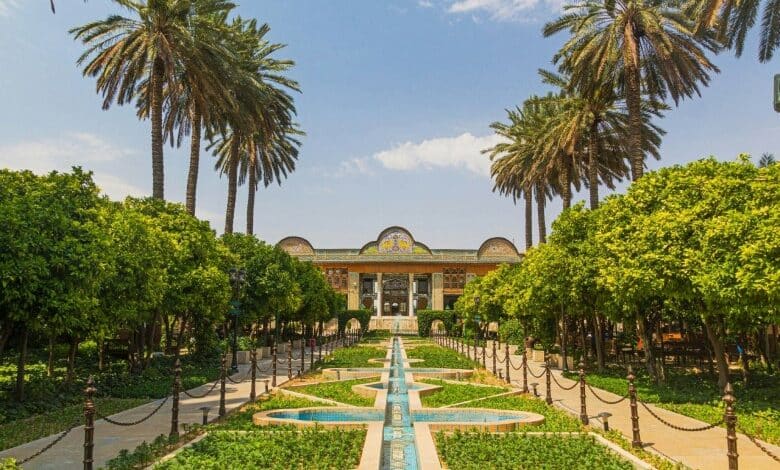
The beautiful Narenjestan-e Ghavam (Qavam Orange Garden) Garden is located in the beautiful city of Shiraz and includes two parts of the garden and the mansion.
In the garden section, you can see a majestic green space. The presence of orange trees in this garden has led to it being named the Narenjestan (Orange Garden). There is also a magnificent mansion in this garden, with eye-catching architecture, which has attracted many domestic and foreign tourists. The basement of this mansion has now been converted into a museum of Iranian historical artifacts.
The construction date of this garden dates back to the Qajar era, which is further explained below.
Contents
The History of the Narenjestan-e Ghavam
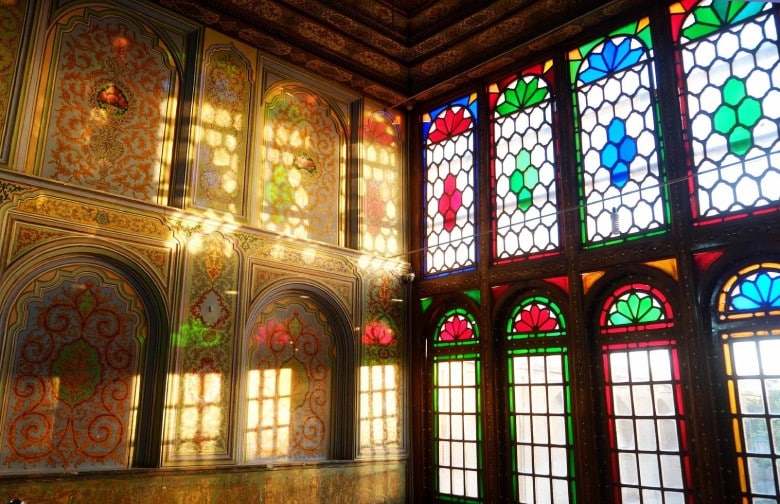
The Narenjestan-e Ghavam was built during the reign of Nasser al-Din Shah Qajar and took 10 years to complete. The exact date of its construction is not known. This garden has been renovated at various times. The building of this garden was donated to Shiraz University in 1966. This beautiful garden was registered as a national monument in 1974.
Unfortunately, during the Islamic Revolution, the eastern iwan of this mansion was damaged by a fire, making it impossible to restore. During the Iran-Iraq war, it was also a place of residence for war-affected families, and a large part of the building was destroyed during this period.
Architecture of the Qavam House
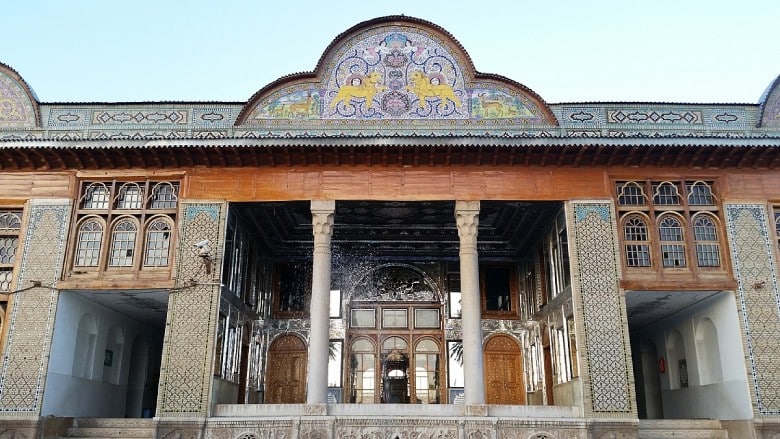
The Narenjestan-e Qavam mansion has a very beautiful architecture, which has made it shine among Iranian gardens. This garden has an area of 3,500 square meters, and the area of the mansion inside it is 940 square meters. The architecture of this mansion is inspired by the architecture of the Zand era and is designed in the Qajar style.
It is interesting to know that this Orange Garden is also recognized as one of the symbols of the seven Iranian arts, namely plasterwork, mirror work, marquetry, brickwork, mosaic, carving and traditional painting. On the walls of the Iwan in this mansion, there are very beautiful plasterwork.
There is a hall called the Mirror Hall in this mansion has a mirror-worked ceiling and the ceilings of the rooms next to it are made of wood with beautiful carvings. In the basement of the mansion, you can see beautiful blue and white tiles.
Different parts of Narenjestan Qavam
This exquisite garden is comprised of various components, of which we shall present the most significant ones below.
Main Entrance of the Qavam House
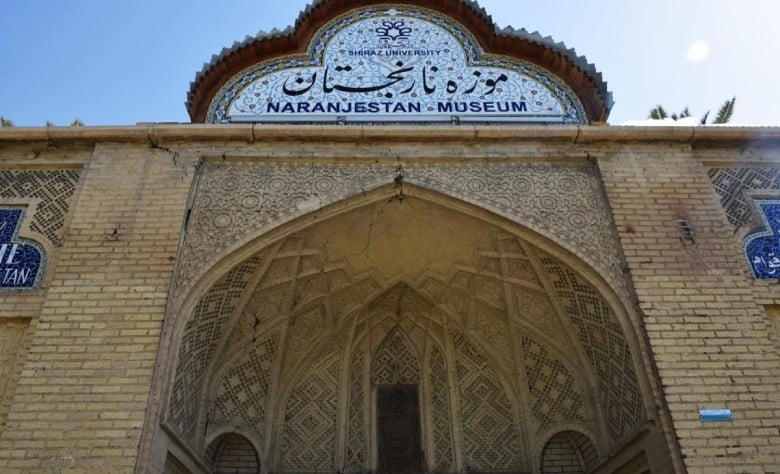
The main entrance of the garden has an arched portal with brick decorations. Above the entrance, there is a marble inscription with Quranic verses inscribed on it. On both sides of this inscription, there are also verses from the Shiraz poet Asoudeh. The entrance has a wooden door made of teak wood, decorated with intricate wood carvings. After passing through the entrance door, there is a hallway that leads into the garden. The ceiling of this hallway is decorated with tiles, bricks, and stucco muqarnas. The ceiling of this corridor is decorated with beautiful tiles, muqarnas and plaster work.
Narenjestan-e Ghavam Garden
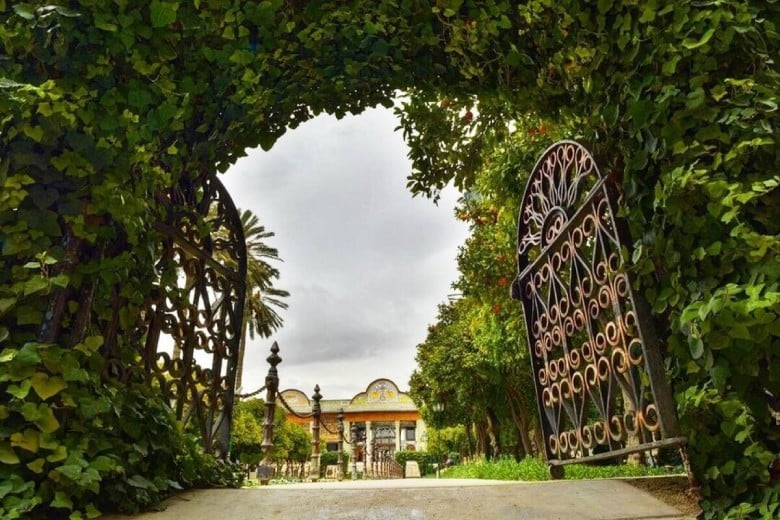
In the center of the garden, facing the mansion, there is a very beautiful pool constructed with red stone pieces. You can see the principle of symmetry in the architecture of the different sections of the garden. In the grounds, you can see palm and orange trees planted in a symmetrical pattern, and visitors pass through these trees to reach the main mansion.
Qavam House’s Porch
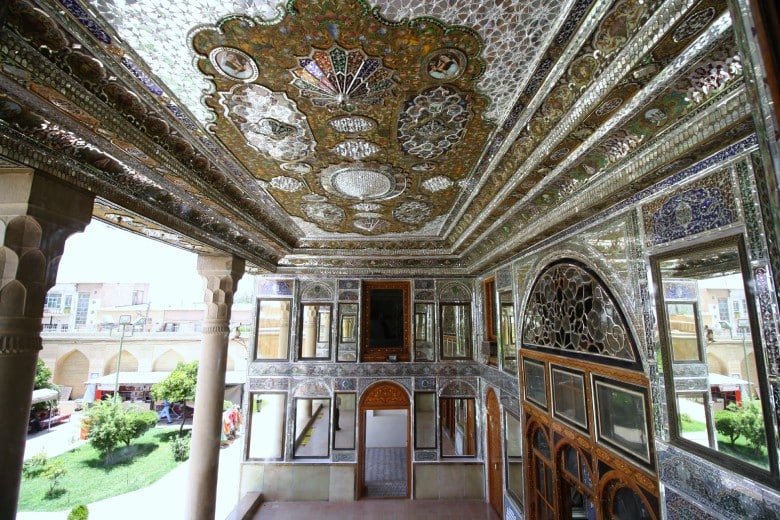
This porch is one of the most beautiful two-column porches, with the columns made of marble. The column capitals also have very beautiful muqarnas carvings. On the center of the porch ceiling, you can observe a painting of a large medallion, with six elliptical scenes painted around it. In front of this porch are the rooms that were used for the accommodation and rest of the shah and his family.
Qavam Mansion Building
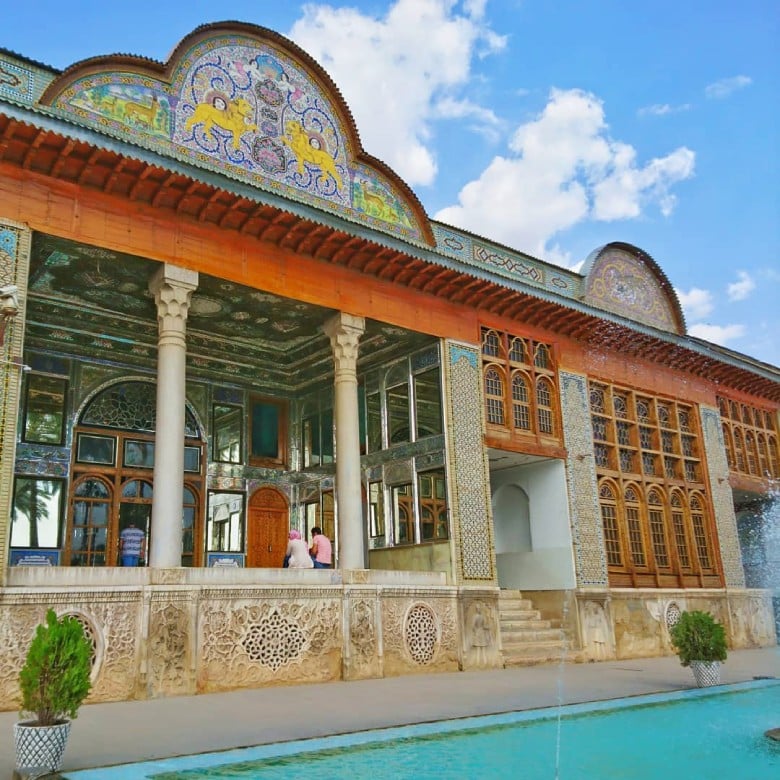
The main mansion of the Narenjestan-e Ghavam is located in the center of the garden and has three floors: ground, first, and basement. And this mansion has 20 rooms, all interconnected and four of them are located on the upper floor.
This building has two sections – the outer and the inner. The inner section contains the Gachineh bathroom, Zinat al-Molk House and the internal parts of the building, while the outer section was used for hosting official gatherings and celebrations. There was a distance of about one alley between the inner and outer sections, connected by an underground tunnel.
The Mirror Hall of Qavam House
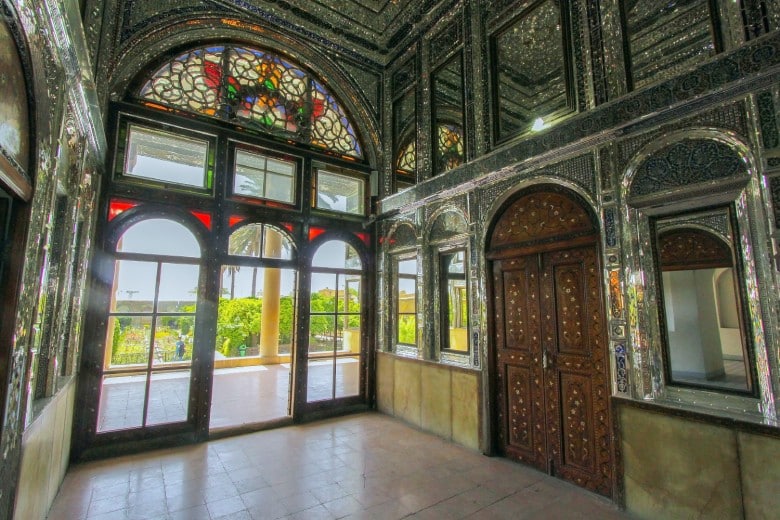
The Mirror Hall, along with the surrounding rooms, has been built using the principles of traditional Iranian architecture. This hall is located in the main building and was constructed during the Qajar era. In this hall, you can observe the beautiful play of light and color.
House of Zinat Al-Molk
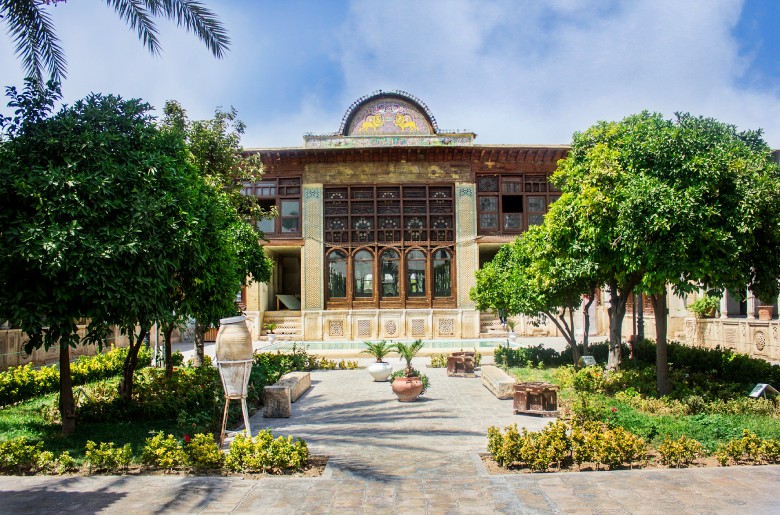
Zinat al-Molk house is one of the most beautiful historical houses in Shiraz. This house is in the inner part of the building which is connected to the building through a corridor. Currently, a museum of the statues of Shiraz elders has also been built in this place.
Diwan Khane of Qavam House (Court)
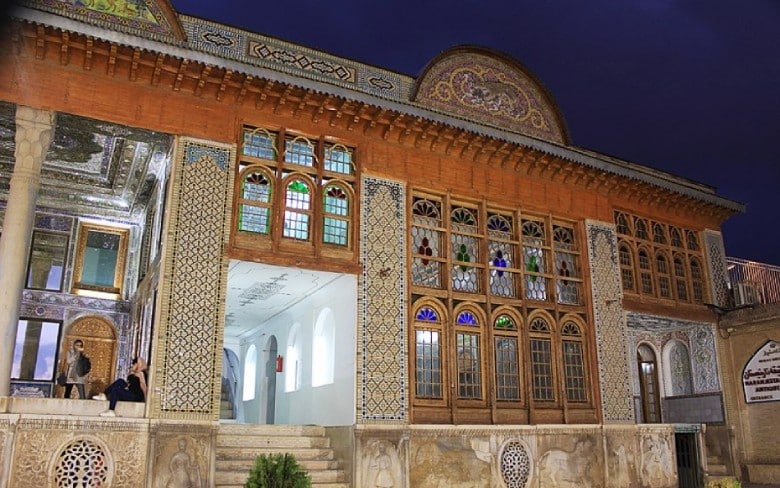
Diwan Khane is located in the southern part of the garden and has 6 rooms with beautifully carved wooden columns, plaster decorations. This mansion is known as Dar al-Hukume and it means the place where political and military affairs are carried out. In this place, the king of Iran met with representatives of foreign governments.
Maktab Khane of Qavam House (School)
This building has also been a place for education and literacy for all family members. The school is located in the eastern part of the building
Museum and Library of Antique Objects in Narenjestan-e Qavam
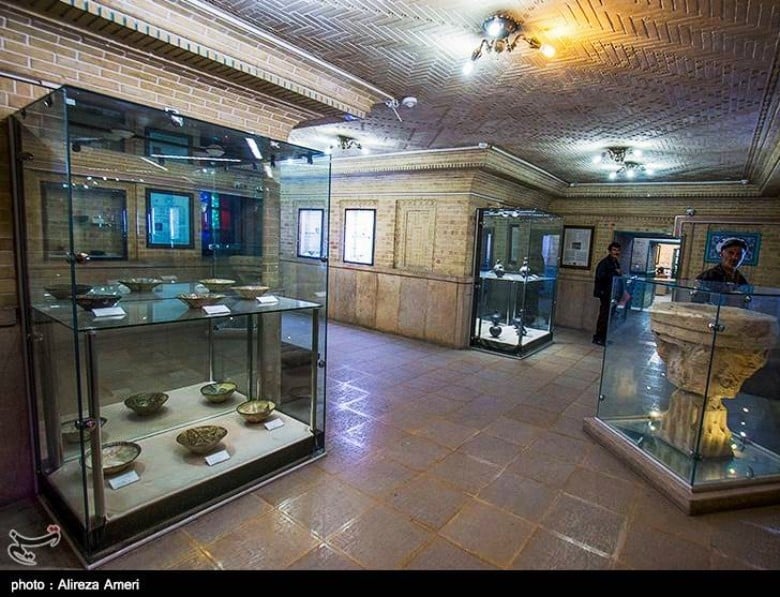
A museum has been established in this building, which houses a library containing the collection of books donated by Professor Pope to Shiraz University.
Best Time to Visit Narenjestan-e Qavam
It is better to visit Shiraz and this garden during the spring season. The best month is April, when you can see the garden in its most beautiful state.
Sum up
Narenjestan-e Qavam is one of the most beautiful gardens of Iran, where the principles of Iranian garden design are clearly observable. By visiting the city of Shiraz, you can not only see this beautiful garden but also explore other attractions of Shiraz city.
FAQs
In what era was Narenjestan-e Qavam garden built?
The Narenjestan-e Qavam garden was built during the Qajar era, during the reign of Naser al-Din Shah Qajar, and its construction lasted for 10 years between 1879 and 1886.
What are the main components of Narenjestan-e Qavam?
This garden consists of two main parts: the building and the garden. The key structures within it include the main building, the Mirror Hall, Zinat-al-Molk building, Maktab and Divan khaneh, the museum and library of antique objects, and more.
What is the best time to visit Narenjestan-e Qavam?
It is best to visit Shiraz and this garden during the spring season, particularly in April, when the garden is in its most beautiful state.


